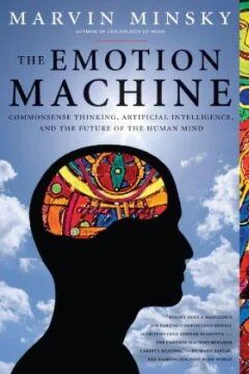However, although the Single-Self concept has practical uses, it does not help us to understand ourselves—because it does not provide us with smaller parts we could use to build theories of what we are. When you think of yourself as a single thing, that gives you no clues about issues like these:
What determines the subjects I think about?
How do I choose what next to do?
How can I solve this difficult problem?
Instead, the Single-Self concept only offers useless answers like these:
My Self selects what to think about.
My Self decides what I should do next.
I should try to make Myself get to work.
Whenever we wonder about our minds, the simpler are the questions we ask, the harder it seems to find answers to them. When you are asked about some difficult task like, “How could a person build a house,” you might answer almost instantly, “Make a foundation and then build walls and a roof.” However, one can scarcely imagine what to say about seemingly simpler questions like these:
How do you recognize things that you see?
How do you comprehend what a word means?
What makes you like pleasure more than pain?
Of course, none of those questions are simple at all. The process of ‘seeing’ a car or a chair uses hundreds of different parts of your brain, each of which does some quite difficult jobs. Then why don’t we sense that complexity? That’s because many processes that are most vital to us have evolved to work inside parts of the brain that have come to function so ‘quietly’ that the rest of our minds have no access to them. This could be why we find it so hard to explain many things we find so easy to do.
In Chapter §9, we’ll come back to that Self—and argue that this, too, is a very large and complicated structure.
Whenever you think about your “Self,” you are switching among a huge network of models, each of which tries to represent some particular aspects of your mind—to answer some questions about yourself.
∞∞∞∞∞∞∞∞∞∞∞∞∞∞∞∞∞∞∞∞
If one should seek to name each particular one of them of which the human heart is the seat, each race of men having found names for some shade of feeling which other races have left undiscriminated … all sorts of groupings would be possible, according as we chose this character or that as a basis. The only question would be, does this grouping or that suit our purpose best?
—William James, in Principles of Psychology.
Sometimes you find yourself in a state where everything seems cheerful and bright. Other times (although nothing has changed) everything seems dreary and dark, and your friends describe you as being depressed. Why do we have such states of mind—or moods, or feelings, or dispositions—and what causes all their strange effects? Here are some of the phrases we find when dictionaries define ‘emotion’.
The subjective experience of a strong feeling.
A state of mental agitation or disturbance.
A mental reaction involving the state of one’s body.
A subjective rather than conscious affection.
The part of consciousness that involves feeling.
A non-rational aspect of reasoning.
If you didn’t yet know what emotions are, you certainly wouldn’t learn much from this. What is subjective supposed to mean? How are emotions involved with feelings ? Must every emotion involve a disturbance ? And what could a conscious affection be?
Why do so many such questions arise when we try to define what ‘emotion’ means? That’s because ‘emotion’ is one of those suitcase-words that covers too wide a range of things. Here are just a few of the hundreds of terms that we use for discussing our mental conditions:
Admiration, Affection, Aggression, Agony, Alarm, Ambition, Amusement, Anger, Anguish, Anxiety, Apathy, Assurance, Attraction, Aversion, Awe, Bliss, Boldness, Boredom, Confidence, Confusion, Craving, Credulity, Curiosity, Dejection, Delight, Depression, Derision, Desire, Detest, Disgust, Dismay, Distrust, Doubt, etc.
Whenever you change your mental state, you might try to use those emotion-words to try to describe your new condition—but usually each such word or phrase refers to too wide a range of states. So, many researchers have spent their lives at trying to classify our states of mind, by stuffing familiar words like these into such classes as humors, emotions, tempers, and moods . But should we call anguish a feeling or mood? Is sorrow a type of agitation? There’s no way to settle the use of such terms because, as William James observed above, different traditions make different distinctions, and may not describe the same states of mind because different people have different ideas. How many readers can claim to know precisely how each of those feelings feels? [3] This list is adapted from a note from Aaron Sloman in comp.ai.philosophy, 16/5/1995.
Grieving for a lost child,
Fearing that nations will never live in peace,
Rejoicing in an election victory,
Excited anticipation of a loved one’s arrival,
Terror as your car loses control at high speed,
Joy at watching a child at play,
Panic at being in an enclosed space.
Although it is hard to define words like feeling and fearing , that’s rarely a problem in everyday life because our friends usually know what we mean. However, attempts to make such terms more precise have hindered psychologists more than they’ve helped to make theories about how human minds work. So this chapter will take a different approach, and think of minds as composed of much smaller parts or processes. This will lead to some new and useful ways to imagine what feeling and thinking might be.
∞∞∞∞∞∞∞∞∞∞∞∞∞∞∞∞∞∞∞
Infants, when suffering even slight pain, moderate hunger, or discomfort, utter violent and prolonged screams. Whilst thus screaming their eyes are firmly closed, so that the skin round them is wrinkled, and the forehead contracted into a frown. The mouth is widely opened with the lips retracted in a peculiar manner, which causes it to assume a squarish form; the gums or teeth being more or less exposed.
—Charles Darwin, in
The Emotions of Animals
One moment your baby seems perfectly well, but then come some restless motions of limbs. Next you see a few catches of breath—and in the next moment, the air fills with screams. Is baby hungry, sleepy, or wet? Whatever it is, those cries compel you to find some action that will help. It may take you some time to discover the trouble, but once you find the remedy, things quickly return to normality. However, if you’re not used to dealing with infants, those sudden switches in mood can upset you; when your friends cry, you can ask them what’s wrong—but talking to infants is fruitless because “no one is home” to communicate with.
Of course, I do not mean to suggest that infants don’t have ‘personalities.’ You can usually sense, quite soon after birth, that a particular baby reacts more quickly, or seems more patient or irritable, or even more inquisitive. Some of those traits may change with time, but others persist through the rest of that life. Nevertheless, we still need to ask, how could an infant change so much between one moment and the next? The Single-Self model cannot explain how suddenly an infant can switch from contentment or calmness to anger or rage.
Читать дальше












